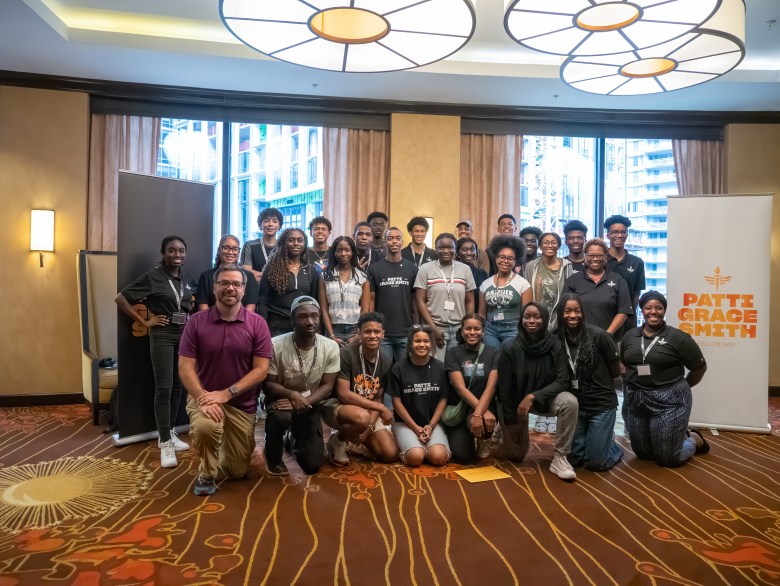Ed Dwight thought he would be an astronaut six decades ago, back when President John F. Kennedy’s administration, in its push for the moon, realized that the impact of America reaching our closest celestial neighbor would be magnified greatly if the crew included a person of color.
“Why don’t we put the first non-white man in space?” Edward Murrow, Kennedy’s director of the U.S. Information Agency, wrote to NASA administrator James Webb in 1961, just five months after the Soviet Union put a person, Yuri Gagarin, into space for the first time ever. “If your boys were to enroll and train a qualified Negro and then fly him in whatever vehicle is available, we could retell our whole space effort to the whole non-white world, which is most of it.”
The climb was steep. While African Americans had pathways into the U.S. military, few had the privilege of becoming pilots in the 1960s, which was the main pathway to becoming an astronaut. Dwight was the only one identified from their ranks as meeting the criteria to be a NASA candidate astronaut.
Why Dwight ultimately wasn’t selected remains a topic of dispute. Not all candidates make it, and NASA could have simply chosen someone else. Or, Dwight may have been subject to the same discrimination that held back scores of African Americans in the Jim Crow era. When asked in 1985, Dwight blamed the assassination of Kennedy as the reason he never flew to space for NASA. He has maintained that support for his flight died with the president.
It wasn’t until 1983 that the first Black astronaut, Penn State alum Guion Bluford, flew to space. Dwight by then had taken up artistry, which would become his focus. Regardless of the cause of Dwight’s omission, one thing remains true: in the 1960s and in the 2020s, there remains a dearth of Black talent flowing into the space sector. In Dwight’s case, America was still actively coming to grips with the equality of its Black citizens. Dr. Martin Luther King was still marching, and Congress was just passing landmark civil rights legislation to protect Black Americans from systemic discrimination.
Today, we as a society have progressed greatly. Dwight’s recent flight is an example of how people are working to correct the failures of the past. On May 19, Blue Origin, a private space company, launched Dwight on its own New Shepard Rocket, sponsored by Space For Humanity, a nonprofit. Dwight achieved his long-deferred dream at the age of 90. This was a fantastic event, yet it also highlights the need to be more proactive and deliberate about progress as a society, particularly for today’s aspiring Black youth. Put frankly, there are still too few African Americans participating in our space sector, be it as astronauts, rocket scientists, satellite engineers, or other vocations.
I see this plainly at industry conferences. Among thousands of attendees, I see at best a few dozen Black participants. Among hundreds of speakers, the number who are Black shrinks to the single digits. At smaller events, sometimes I am the only one.
Four years ago, a handful of space industry leaders banded together around the vision of seeing more African Americans get space careers. Those leaders — retired astronaut B. Alvin Drew, Jr, United Airlines Interiors Engineer Khristian Jones, NASA Engineer Tiffany Lockett and AeroVironment executive Will Pomerantz — created the Patti Grace Smith Fellowship (PGSF), an organization that provides internships at space companies for Black college students, along with scholarships, mentorships and networking opportunities. The Jim Crow years may be over, but the scars they left are still evident by the paucity of Black participants in the space sector. PGSF aims to fill, as best we can, the hole left by historical injustices. We are creating pathways for Black students who, like Dwight, dream of going to space and advancing humanity’s presence in the cosmos.
Since our founding, 104 “Patties” have completed fellowships through our organization, the earliest of whom are just starting to enter the workforce. One of them is now a Blue Origin engineer who helped facilitate activities the day of Dwight’s flight.

“Being a part of the magic that was the NS-25 launch today was truly a once in a lifetime experience,” said PGSF graduate Emily Burrus, who guided youth events at the launch. “Ed’s story is a beacon of hope for all those who may have had their dream opportunities passed up due to prejudices outside their control … His resilience inspires me greatly and I was honored to meet a man who just changed the world forever.”
Adam Ben Youssef, one of the 29 upcoming PGS Fellows in our class of 2024, also attended the flight.
“Today was so action packed that it will likely take me a couple of days to really process what I just experienced,” he said at the May 19 event. “But one thing I know I will take with me is that no matter what I face, I will never give up striving for greatness.”
PGSF is creating the next wave of Black Excellence. We encourage students interested in space and aerospace careers to apply for our program later this summer. Companies or individuals that wish to support our cause can donate through our website. Here’s to creating more Ed Dwights.
Caleb Henry is an executive member of the Patti Grace Smith Fellowship, an all-volunteer nonprofit that provides extraordinary Black students with work experiences in the space and aerospace industries. He co-leads the fellowship alongside Juanitta “AJ” Bekoe, Khristian Jones, Tiffany Lockett and Will Pomerantz.
- SEO Powered Content & PR Distribution. Get Amplified Today.
- PlatoData.Network Vertical Generative Ai. Empower Yourself. Access Here.
- PlatoAiStream. Web3 Intelligence. Knowledge Amplified. Access Here.
- PlatoESG. Carbon, CleanTech, Energy, Environment, Solar, Waste Management. Access Here.
- PlatoHealth. Biotech and Clinical Trials Intelligence. Access Here.
- Source: https://spacenews.com/americas-first-black-astronaut-candidate-finally-flew-now-time-make-more/



